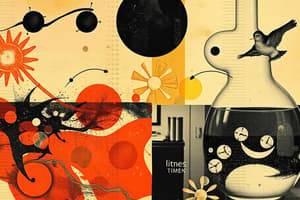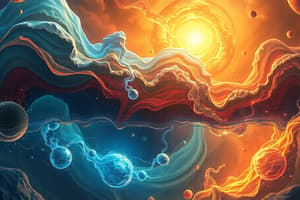Podcast
Questions and Answers
In which phase of water are the molecules close together but able to move around to some extent?
In which phase of water are the molecules close together but able to move around to some extent?
- Liquid (correct)
- Plasma
- Solid
- Gas
Which of the following phase conversions is usually involved in distillation?
Which of the following phase conversions is usually involved in distillation?
- Liquid to gas (correct)
- Gas to solid
- Solid to liquid
- Liquid to solid
Filtration usually involves separating which phases from a mixture?
Filtration usually involves separating which phases from a mixture?
- Solid from gas
- Liquid from gas
- Liquid from liquid
- Solid from liquid (correct)
Which of the following represents a heterogeneous mixture?
Which of the following represents a heterogeneous mixture?
What is the smallest unit of a chemical compound?
What is the smallest unit of a chemical compound?
Which of the following statements describes a chemical property?
Which of the following statements describes a chemical property?
In which phase of water are the molecules far apart and move randomly?
In which phase of water are the molecules far apart and move randomly?
Which of the following phase changes typically involves the absorption of heat?
Which of the following phase changes typically involves the absorption of heat?
Which process is generally used for separating components of a liquid mixture based on boiling points?
Which process is generally used for separating components of a liquid mixture based on boiling points?
Which of the following describes a physical change?
Which of the following describes a physical change?
Which state of matter is characterized by having both definite volume and definite shape?
Which state of matter is characterized by having both definite volume and definite shape?
What type of change occurs when water boils?
What type of change occurs when water boils?
Which of the following processes is indicative of a chemical change?
Which of the following processes is indicative of a chemical change?
Which situation exemplifies a physical change?
Which situation exemplifies a physical change?
Which process does not involve a chemical change?
Which process does not involve a chemical change?
What occurs during a chemical change?
What occurs during a chemical change?
Which state of matter has neither a definite shape nor a definite volume?
Which state of matter has neither a definite shape nor a definite volume?
Which of the following changes is a demonstration of a chemical reaction?
Which of the following changes is a demonstration of a chemical reaction?
Under what condition is iodine in a gaseous state?
Under what condition is iodine in a gaseous state?
Which change involves the transformation of a substance without altering its chemical identity?
Which change involves the transformation of a substance without altering its chemical identity?
Which of the following accurately describes an example of a homogeneous mixture?
Which of the following accurately describes an example of a homogeneous mixture?
Which of these substances is classified as a compound?
Which of these substances is classified as a compound?
What distinguishes a physical change from a chemical change?
What distinguishes a physical change from a chemical change?
Which of the following describes an element?
Which of the following describes an element?
Which statement is true about a solution compared to a compound?
Which statement is true about a solution compared to a compound?
True or False: The boiling of water is an example of a chemical change.
True or False: The boiling of water is an example of a chemical change.
Which of these represents a process requiring chemical methods for separation?
Which of these represents a process requiring chemical methods for separation?
How many of the listed substances are chemically pure?
How many of the listed substances are chemically pure?
Which of the following is an incorrect classification of a mixture?
Which of the following is an incorrect classification of a mixture?
Which phase of water has molecules that are farthest apart?
Which phase of water has molecules that are farthest apart?
Flashcards are hidden until you start studying
Study Notes
States of Matter
- Gaseous state: no definite shape or volume.
- Liquid state: definite volume but no definite shape.
- Solid state: both definite volume and shape.
- Matter: anything that possesses mass and volume.
Changes in Matter
- Physical changes: alterations that do not affect the chemical composition.
- Examples: boiling water, ironing a shirt, evaporating alcohol.
- Sugar dissolving in coffee is a physical change.
- Chemical changes: transformations that result in new chemical substances.
- Examples: cooking an egg, burning gasoline, fermentation of fruit juice.
- Metal rusting is a chemical change.
Properties of Substances
- Chemical properties: characteristics that involve chemical reactions.
- Gold is considered nonreactive (inert).
- A chemical change can result in substances with different properties.
- Physical properties: characteristics identifiable without changing the substance.
- Water’s boiling point (100°C) is a physical property.
Classifications of Matter
- Pure substances: materials with uniform composition, such as elements and compounds.
- Elements: pure substances that cannot be broken down; examples include aluminum and oxygen.
- Compounds: substances formed from chemical combinations of elements; examples include water (H2O) and ammonia (NH3).
- Mixtures: combinations of two or more substances that maintain their individual properties; can be homogeneous (uniform composition) or heterogeneous (distinct components).
Processes and Characteristics
- Filtration: method for separating solids from liquids.
- Distillation: process typically involving the conversion of a liquid to gas and back, used to separate components based on differences in boiling points.
- Molecules in different states of water:
- Solid: molecules close and rigid.
- Liquid: molecules close yet mobile.
- Gas: molecules far apart and move freely.
True/False Statements
- An element can consist only of single atoms: False (can form diatomic molecules).
- A solid substance is matter: False (solid substances are indeed matter).
- Juice freezing is a physical change: True.
- Boiling water involves a chemical change: False (it’s a physical change).
Additional Notes
- Compounds have a constant composition, while mixtures can vary.
- Homogeneous mixtures are also known as solutions.
- Only burning a substance constitutes a chemical change, while melting or boiling involves physical changes.
Studying That Suits You
Use AI to generate personalized quizzes and flashcards to suit your learning preferences.




